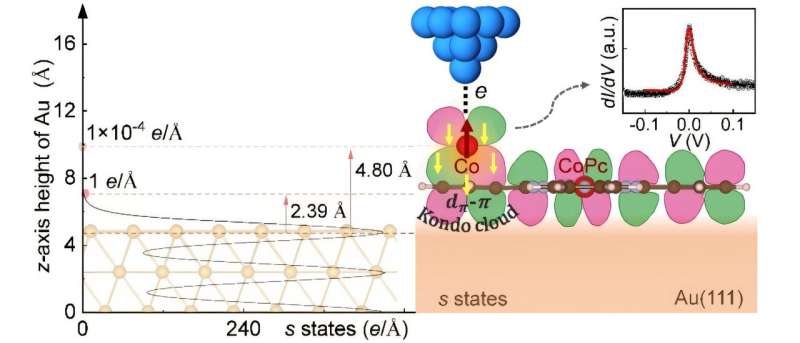
A research team led by Prof. Li Xiangyang from the Hefei Institutes of Physical Science, part of the Chinese Academy of Sciences, has revealed a significant breakthrough in quantum physics. Their study demonstrates that a single organic molecule can trigger the Kondo effect in a magnetic atom, challenging the longstanding belief that a large reservoir of metallic electrons is necessary for this quantum phenomenon. The findings were published on November 7, 2025, in the journal Physical Review Letters.
The Kondo effect refers to a quantum many-body phenomenon where conduction electrons in a metal collectively screen the magnetic moment of a localized impurity atom. This effect has been crucial in explaining strongly correlated electron behavior and has inspired significant advances in fields such as nanoscience, molecular electronics, and quantum information research. Traditionally, it was thought that the Kondo effect could only manifest in systems containing a vast sea of metallic electrons, making this new discovery particularly noteworthy.
The researchers focused on cobalt phthalocyanine (CoPc) molecules deposited on a metallic substrate. They found that these molecules could function as an itinerant-like electron reservoir capable of screening the spin state of a cobalt atom. This interaction led to the creation of the first-ever “molecular Kondo box.”
In their study, the team utilized both first-principles calculations and experimental validation. They discovered that in the Co–CoPc/Au(111)Au(111) substrate. This hybridization enables the molecule’s π-electrons to exhibit itinerant-like behavior, while their π-orbitals significantly overlap with the dπ orbitals of the cobalt atom. This overlap suppresses competing screening from the metallic substrate, allowing for the formation of a Kondo singlet at the molecular scale.
One of the remarkable aspects of this discovery is the ability to precisely tune the corresponding Kondo temperature by adjusting the number of cobalt atoms and the overall symmetry of the molecular system. According to the research team, this not only enhances the fundamental understanding of Kondo physics but also showcases a new level of stability and tunability in spin states.
This innovative research paves the way for future investigations into molecular-scale phenomena and could have far-reaching implications in various scientific domains. The ability to manipulate spin states at such a fundamental level opens new avenues for advancements in quantum technologies.
For further details, see the original study: Xiangyang Li et al, Co and CoPc Molecular Kondo Box on Gold Surface, Physical Review Letters (2025). DOI: 10.1103/65qq-dknn.






